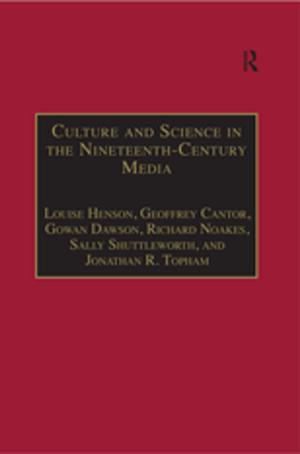The Sound of Shakespeare
Nonfiction, Entertainment, Performing Arts, Theatre, Acting & Auditioning, Fiction & Literature, Literary Theory & Criticism, British| Author: | Wes Folkerth | ISBN: | 9781317797203 |
| Publisher: | Taylor and Francis | Publication: | June 3, 2014 |
| Imprint: | Routledge | Language: | English |
| Author: | Wes Folkerth |
| ISBN: | 9781317797203 |
| Publisher: | Taylor and Francis |
| Publication: | June 3, 2014 |
| Imprint: | Routledge |
| Language: | English |
The 'Sound of Shakespeare' reveals the surprising extent to which Shakespeare's art is informed by the various attitudes, beliefs, practices and discourses that pertained to sound and hearing in his culture.
In this engaging study, Wes Folkerth develops listening as a critical practice, attending to the ways in which Shakespeare's plays express their author's awareness of early modern associations between sound and particular forms of ethical and aesthetic experience. Through readings of the acoustic representation of deep subjectivity in Richard III, of the 'public ear' in Antony and Cleopatra, the receptive ear in Coriolanus, the grotesque ear in A Midsummer Night's Dream, the 'greedy ear' in Othello, and the 'willing ear' in Measure for Measure, Folkerth demonstrates that by listening to Shakespeare himself listening, we derive a fuller understanding of why his works continue to resonate so strongly with is today.
The 'Sound of Shakespeare' reveals the surprising extent to which Shakespeare's art is informed by the various attitudes, beliefs, practices and discourses that pertained to sound and hearing in his culture.
In this engaging study, Wes Folkerth develops listening as a critical practice, attending to the ways in which Shakespeare's plays express their author's awareness of early modern associations between sound and particular forms of ethical and aesthetic experience. Through readings of the acoustic representation of deep subjectivity in Richard III, of the 'public ear' in Antony and Cleopatra, the receptive ear in Coriolanus, the grotesque ear in A Midsummer Night's Dream, the 'greedy ear' in Othello, and the 'willing ear' in Measure for Measure, Folkerth demonstrates that by listening to Shakespeare himself listening, we derive a fuller understanding of why his works continue to resonate so strongly with is today.















